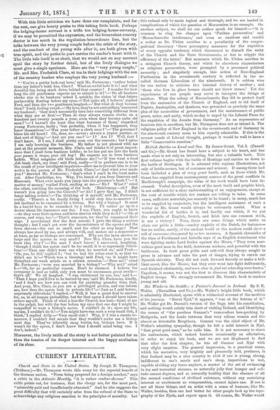CURRENT LITERATURE.
Church and State in the United States. By Joseph B. Thompson. (Trilbner.)—Mr. Thompson wrote this essay for the especial benefit of the German nation. "From being prepared for a foreign market," says a critic in the Atlantic Monthly, "it is rather couleur-de-rose." This critic points out, for instance, that the clergy are, for the most part, "miserably paid and insufficiently educated." And he also suggests the great difficulty that will certainly arise from the refusal of the State to acknowledge any religious sanction to the principles of morality. Let this refusal only be made logical and thorough, and we are landed in complications of which the question of Mormonism is an example. On another subject, we shall let our author speak for himself :—"It is common to ring the changes upon 'Puritan persecution' and 'Massachussotts intolerance,' and even so cautious and candid a writer as Dr. Ubden ascribes to a peculiarity of the congre- gational theocracy these peremptory measures for the expulsion of every opposite tendency which threatened to disturb the unity of the Church and the State Governments, or but to cripple the efficiency of the latter.' But measures which Dr. Ubden ascribes to a stringent Church theory, and which he elsewhere characterises as religious persecution, were prompted by a presumed political necessity ; and singularly enough, this action of New-England Puritanism in the seventeenth century is reflected in the so- called German Liberalism of the nineteenth. It is seldom wise for one nation to criticise the internal history of another ; and 'those who live in glass houses should not throw stones.' Yet the experiences of one people may serve to interpret the doings of another. What the colony of Massachusetts Bay did to protect itself from the emissaries of the Church of England, and to rid itself of Papists, Anabaptists, and Quakers, was grounded on precisely the same plea of the necessities of government, and the maintenance of public peace, order, and unity, which to-day is urged by the Liberal Press for the expulsion of the Jesuits from Germany." As an argwnentwn ad hominem this is excellent, but Mr. Thompson does not so intend it. The religions policy of New England in the seventeenth and of Germany in the nineteenth century seem to him equally admirable. If this is the newest result of Liberal thought, perhaps it would be well to have a little "Conservative reaction."


































 Previous page
Previous page